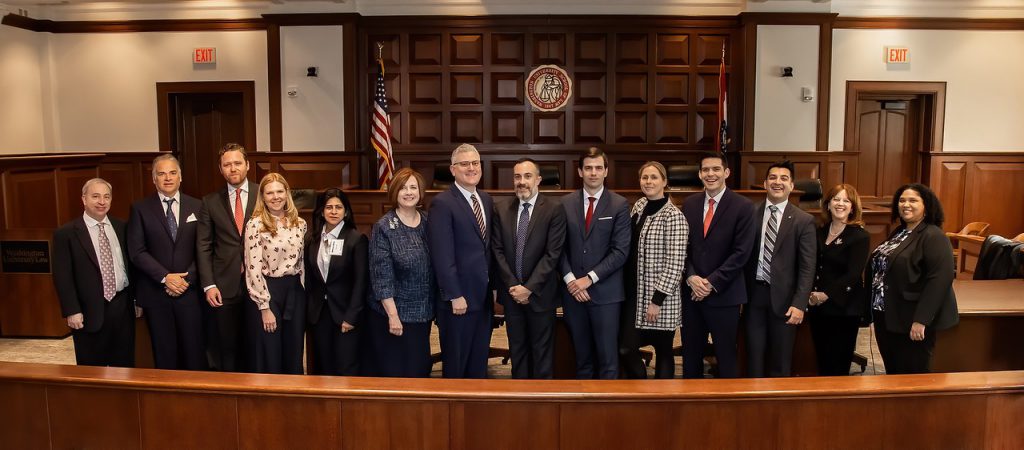By: Ivan-Axel Doubrava, LL.M. Candidate Washington University School of Law, Negotiation & Dispute Resolution
Madaline George, JD ’14, Whitney R. Harris World Law Institute Fellow, Washington University School of Law

On February 21, 2020, Washington University in St. Louis School of Law’s Whitney R. Harris World Law Institute and Negotiation and Dispute Resolution Program hosted the Third International Arbitration & Dispute Resolution Symposium: What Happens Before and After International Arbitration? in St Louis, Missouri.

This year’s Symposium focused on the various challenges and opportunities present in international arbitration prior to the commencement of the arbitration and after the arbitral proceeding has concluded. Practitioners, in-house counsel, arbitrators, academics, and representatives from arbitral institutions offered their perspectives on not only considerations to be taken into account when drafting arbitration clauses and in the necessary management of the dispute, but also what problems can be expected once the award has been rendered, and how best to prepare for and address those issues. While many may consider the arbitration process to be simply the period which occurs between the moment the request for arbitration is filled and the final award, this group of experts demonstrated that a host of other issues must be considered to ensure an effective and efficient arbitral process, including developing the case, understanding nuances of different arbitral rules, third-party funding, estimation of damages, and enforcement and monetizing the arbitral award.
The program kicked off with a thought-provoking keynote address by Mahnaz Malik (Twenty Essex). Ms. Malik took the audience on a journey through the pivotal in the history of international arbitration, reflecting on how we got here, and what that means for where we are going in the field. She challenged listeners to understand the reasons behind the craze for arbitration nowadays. Starting from the observation that different countries in the 1980s used arbitration as a means of attracting investors with promises of fair treatment, Ms. Malik explained how arbitration became mainstream, while cautioning against the backlash expressed recently by courts, such as in the Achmea case where intra-EU BITs were recognized as incompatible with EU law, causing turmoil across a continent.

The first panel, Tips & Tricks: Strategic Considerations for Successful Arbitration, explored pre-arbitration recommendations within the confines of a governing arbitration provision. Moderated by Nicole Y. Silver (Greenberg Traurig LLP), this panel offered insider recommendations that are useful in an environment where parties are increasingly turning to arbitration to resolve international and domestic disputes. The panel, composed of Paul Brooks (The Claro Group), Alex Kaplan (ICSID), and Ben Love (Reed Smith LLP), covered topics including settlement and mediation, working with in-house counsel to develop facts and the legal claims, calculating damages in advance of filing a request for arbitration, and planning the arbitral process itself.

The Symposium’s second session, Challenging and Enforcing Arbitration Awards, was moderated by Miloš Ivković. The arbitral process results in a final and binding award that has immediate legal effects and creates immediate rights and obligations for the disputing parties. Nevertheless, one or both parties sometimes refuse to comply with the arbitral award. In this panel, Patrick Dempsey (Therium Capital Management), Nicole Dolenz (Orrick Herrington & Sutcliffe LLP), and M. Imad Khan (Winston & Strawn LLP) addressed the legal and practical hurdles parties face when challenging or enforcing awards rendered in international investment and commercial arbitral proceedings, including the legal frameworks applicable to setting aside or annulling an arbitral award, the recognition and enforcement of awards, and the practicalities of monetizing an arbitral award.

The day’s program concluded with a Mock Appellate Argument on compelling arbitration under U.S. Law. Frédéric G. Sourgens (Washburn University School of Law) drafted the problem, which explored the problems facing counsel and judges in enforcing arbitration agreements. Heaven Chee (Yetter Coleman LLP) played the role of attorney for the Plantiff – a British Columbia-based owner/operator of a hotel in Cancun, Mexico, which brought suit in the U.S. District Court for the Eastern District of Missouri for violation of a hotel services agreement and for tortious interference with business. Victoria Sahani (Sandra Day O’Connor College of Law, Arizona State University) represented the Defendant – a Maryland-based hospitality company, which moved to compel arbitration under the arbitration clause contained in the same agreement. The exercise took place after the District Court compels arbitration of the tort and the breach of contract claims based on the broadly worded arbitration clause and the plaintiff appeals the order compelling arbitration. The case was argued in front of an Appellate Court composed of Eric Bloom (Winston & Strawn LLP), Steven “Cash” Nickerson (AKKA Technologies), and Ann Ryan Robertson (Locke Lord LLP). This practical exercise exposed the complex problems facing counsel and judges in enforcing contradictory clauses within an arbitration agreement and offered useful recommendations that current and future practitioners can use to avoid similar situations.

The 2020 Symposium was chaired by M. Imad Khan (Winston & Strawn, LLP); generously sponsored by the Claro Group, Winston & Strawn LLP, U.S. Arbitration & Mediation, and WashULaw’s International Law Society; and supported by Washington University School of Law’s Negotiation & Dispute Resolution Program; the American Arbitration Association and its International Centre for Dispute Resolution; the American Branch of the International Law Association; the Chartered Institute of Arbitrators’ North American Group and Young Members Group; the ICC International Court of Arbitration; the National Academy of Arbitrators; and Young ICSID.
The Symposium advances the development of international arbitration and dispute resolution, educates the next generation of lawyers, and provides key networking opportunities. More information about this and previous Symposiums, including videos, can be found online.
